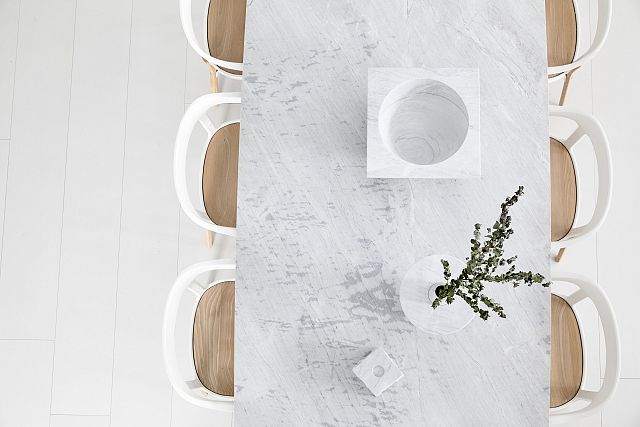Maintaining your natural stone surfaces will keep them looking and performing in top condition. The more effort you put into maintaining natural stone, the better it will look and longer it will endure.
In our Expert Series on natural stone, you’ll learn about resealing, cleaning and rehoning stone as an important part of your care and maintenance regime.

Resealing natural stone
Sealing stone makes it easier to look after and maintain. It will typically be sealed when installed (by yourself or a professional), and should be resealed regularly to protect the stone from substances and permanent marks.
There are three types of sealers: penetrating, surface and topical. A penetrating sealer is suitable for a general domestic environment. It penetrates the stone, retaining its colour, tone and texture. A surface sealer is used for slate and other dense stones. It forms a coat, like a lacquer, on the surface of the stone, changing its colour, tone, and texture. A topical sealer is used for commercial purposes. Its more robust and can be used to reduce slip on a stone floor, for example.
We can provide advice about the best sealer for your natural stone and needs, as well as samples of stone with an applied sealer. This will help you understand the aesthetic and performance of the sealed stone.
Cleaning natural stone
We recommend cleaning your natural stone with water or a pH-neutral cleaner and a microfiber cloth.
Avoid cleaning products from the supermarket as they have a caustic or acidic base that can deplete the effectiveness of the sealing.
Always wipe up spills as soon as possible. You wouldn’t leave spilt red wine to soak into your carpet, and stone surfaces are no different, as leaving contaminants for long periods of time will damage the stone. Fortunately, natural stone can be repaired if it is stained or marked. Rehoning the stone will return it to its prime condition.
Rehoning natural stone
Spills of acidic products, such as alcohols, vinegars and citric juices, can attack your stone surface and take the hone or polish off it, even when it’s well sealed. Similarly, scratches and abrasions can permanently blemish the stone. This is the time to have the surface re-honed by a stone mason.
However, if you like a natural stone with patina, leaving the marks and stains to dissipate will allow the surface to show its age and wear.
Designing with natural stone
While stone is a dense and durable material, it is also relatively brittle and can chip or crack when not designed or used properly. Rounding the edges of a kitchen benchtop will limit damage that can be caused by objects, such as plates or utensils, hitting the side of the stone.
Installing natural stone
Natural stone is inherently porous and needs to be carefully handled during transportation and installation. The moisture content and glues also need to be considered as these need to dispel from underneath the stone, rather than up through the stone and out through the edges.
How Artedomus can help
We are always happy to help you look after and maintain your natural stone surfaces. Simply call us if your natural stone is marked or damaged, and we can suggest methods to try yourself, or refer you to a professional to ensure you get the best result.
View the rest of the Expert Series here